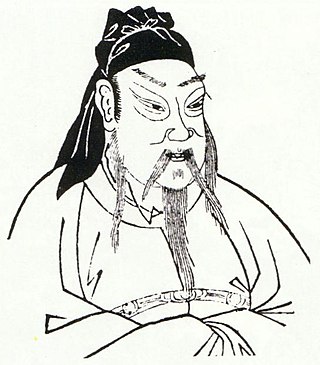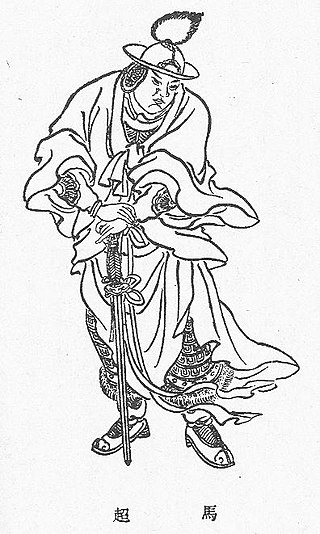Related Research Articles

Romance of the Three Kingdoms is a 14th-century historical novel attributed to Luo Guanzhong. It is set in the turbulent years towards the end of the Han dynasty and the Three Kingdoms period in Chinese history, starting in 184 AD and ending with the reunification of the land in 280 by Western Jin. The novel is based primarily on the Records of the Three Kingdoms (三國志), written by Chen Shou.

Guan Yu, courtesy name Yunchang, was a Chinese military general serving under the warlord Liu Bei during the late Eastern Han dynasty of China. Along with Zhang Fei, he shared a brotherly relationship with Liu Bei and accompanied him on most of his early exploits. Guan Yu played a significant role in the events leading up to the end of the Han dynasty and the establishment of Liu Bei's state of Shu Han during the Three Kingdoms period. While he is remembered for his loyalty towards Liu Bei, he is also known for repaying Cao Cao's kindness by slaying Yan Liang, a general under Cao Cao's rival Yuan Shao, at the Battle of Boma. After Liu Bei gained control of Yi Province in 214, Guan Yu remained in Jing Province to govern and defend the area for about seven years. In 219, while he was away fighting Cao Cao's forces at the Battle of Fancheng, Liu Bei's ally Sun Quan broke the Sun–Liu alliance and sent his general Lü Meng to conquer Liu Bei's territories in Jing Province. By the time Guan Yu found out about the loss of Jing Province after his defeat at Fancheng, it was too late. He was subsequently captured in an ambush by Sun Quan's forces and executed.

Ma Chao (176–222), courtesy name Mengqi, was a Chinese military general and warlord who lived in the late Eastern Han dynasty and early Three Kingdoms period of China. A descendant of the general Ma Yuan, Ma Chao was the eldest son of Ma Teng, a prominent warlord in Liang Province. In 211, he formed a coalition with Han Sui and other northwestern warlords and revolted against the Han central government, which was led by the warlord Cao Cao. The coalition broke up after losing the Battle of Tong Pass against Cao Cao's forces. Ma Chao initially retreated, but later returned to attack and seize control of Liang Province by killing the provincial inspector Wei Kang and forcing Wei Kang's subordinates to submit to him. About a year after Ma Chao started his uprising, Emperor Xian issued an imperial decree ordering the execution of Ma Chao's family members, who were in Ye city at the time. In the meantime, Wei Kang's subordinates, led by Zhao Ang, Yang Fu and others, rebelled against Ma Chao and forced him out of Liang Province. Ma Chao retreated to Hanzhong Commandery, where he borrowed troops from the warlord Zhang Lu, and returned to attack Liang Province but was ultimately defeated and driven back. Ma Chao took shelter under Zhang Lu for a while until around 214, when he heard that the warlord Liu Bei was fighting for control over Yi Province with Yi Province's governor, Liu Zhang. He defected to Liu Bei's side and assisted Liu Bei in capturing Yi Province from Liu Zhang. Ma Chao had served as a general under Liu Bei since then and participated in the Hanzhong Campaign in 219. He died in 222.

Pang De, courtesy name Lingming, was a Chinese military general who lived during the late Eastern Han dynasty. He started his career under the warlord Ma Teng, who was based in Liang Province. In 211, Ma Teng's son Ma Chao, along with a coalition of warlords from Liang Province, started a rebellion against the Han central government, which was controlled by the warlord Cao Cao. After Cao Cao defeated Ma Chao and the coalition at the Battle of Tong Pass, Ma Chao fled to Hanzhong Commandery and took shelter under the warlord Zhang Lu. Pang De accompanied him to Hanzhong. When Ma Chao defected from Zhang Lu's side in order to join the warlord Liu Bei, Pang De remained in Hanzhong and eventually came to serve Cao Cao after Cao Cao defeated Zhang Lu at the Battle of Yangping and took over Hanzhong. In 219, Pang De fought at the Battle of Fancheng under Cao Ren's command against Liu Bei's forces led by Guan Yu. Pang De was captured in battle and eventually executed by Guan Yu when he refused to surrender.

Pang Tong (179–214), courtesy name Shiyuan, was a Chinese politician who served as the key adviser to the warlord Liu Bei in the late Eastern Han dynasty of China. In his youth, Pang Tong was disregarded because he was plain looking, however Sima Hui highly esteemed him calling him the "Crown of Scholars in Jing Province". He studied under him along with Zhuge Liang, Xu Shu and Xiang Lang and was given the nickname of "Fledgling Phoenix". Because of his friendly attitude, he worked as an appraiser in Nan Commandery. When reviewing someone, he would prioritize their virtue over their abilities and would encourage them to help others.

Yan Yan was a Chinese military general and politician who served under Liu Zhang, the Governor of Yi Province, during the late Eastern Han dynasty of China. Although there is very little information about Yan Yan in historical records, he is given a much prominent role in the 14th-century historical novel Romance of the Three Kingdoms as a general who initially serves under Liu Zhang before switching allegiance to Liu Bei later.
Zhang Lu, courtesy name Gongqi, was a Chinese politician, religious leader, and warlord who lived during the late Eastern Han dynasty. He was the third generation Celestial Master, a Taoist religious order. He controlled a state in the Hanzhong region, which he had named Hanning (漢寧) until 215, when he surrendered to Cao Cao, whom he would serve until his death one year later.

Zhang Ren was a Chinese military general serving under the warlord Liu Zhang during the late Eastern Han dynasty of China.

Liu Zhang, courtesy name Jiyu, was a Chinese politician and warlord who served as provincial governor who lived in the late Eastern Han dynasty of China. He became the Governor of Yi Province, succeeding his father Liu Yan and ruled the region until 214, when he surrendered to Liu Bei. Six years later, Liu Zhang again surrendered to Eastern Wu, and died shortly afterwards. Liu Zhang is often considered an incapable leader but is noted to have been the original lord of some of Shu Han's most famous generals and officials such as Fa Zheng, Meng Da, Zhang Ni, Liu Ba, Huang Quan, Wu Yi, Li Yan, Dong He and others.

Zhang Song (died January or February 213, courtesy name Ziqiao, was an official and adviser serving under the warlord Liu Zhang during the late Eastern Han dynasty of China.
Pang Xi was an official serving under the warlords Liu Yan, Liu Zhang and Liu Bei during the Eastern Han dynasty of China.

Romance of the Three Kingdoms is a Chinese television series adapted from the classical 14th century novel of the same title by Luo Guanzhong. The series was produced by China Central Television (CCTV) and was first aired on the network in 1994. It spanned a total of 84 episodes, each approximately 45 minutes long. One of the most expensive television series produced at the time, the project was completed over four years and involved over 400,000 cast and crew members, including divisions of the People's Liberation Army from the Beijing, Nanjing and Chengdu military regions. Some of the dialogues spoken by characters were adapted directly from the novel. Extensive battle scenes, such as the battles of Guandu, Red Cliffs and Xiaoting, were also live-acted.

Sun Qian, sometimes known as Sun Gan, courtesy name Gongyou, was a Chinese diplomat and official serving under the warlord Liu Bei in the late Eastern Han dynasty of China. His talent was noted by the scholar Zheng Xuan. Therefore, Liu Bei gave Sun Qian a position on his staff after he took Xu. Along with Jian Yong and Mi Zhu, Sun Qian frequently served as an ambassador for Liu Bei, most notably to Yuan Shao and Liu Biao. After Liu Bei took Yi Province, Sun Qian was promoted and held a rank equal to Jian Yong.
Liu Yan, courtesy name Junlang, was a Chinese politician and warlord who lived in the late Eastern Han dynasty of China. He was also a member of the extended family of the Han emperors. For most of his career he served as the Governor of Yi Province, which he developed into an independent power base. His domain was passed on to his son Liu Zhang, and eventually to Liu Bei, who founded the state of Shu Han during the Three Kingdoms period.
The Battle of Xiapi was fought between the forces of Lü Bu against the allied armies of Cao Cao and Liu Bei from the winter of 198 to 7 February 199 towards the end of the Eastern Han dynasty in China. The battle concluded with victory for Cao Cao and Liu Bei, with Lü Bu being subsequently executed.
Jiang Gan, courtesy name Ziyi, was a debater and scholar who lived during the late Eastern Han dynasty of China. He is best known for his attempt to persuade Zhou Yu, a general serving under the warlord Sun Quan, to defect to Sun Quan's rival Cao Cao after the Battle of Red Cliffs in the winter of 208–209. In the 14th-century historical novel Romance of the Three Kingdoms, the entire incident not only takes place before the battle, but is also heavily dramatised and exaggerated.
Liu Bei's takeover of Yi Province was a military campaign by the warlord Liu Bei in taking control of Yi Province from the provincial governor, Liu Zhang. The campaign took place between the years 211 and 214 in the late Eastern Han dynasty; although the conflict between Liu Bei and Liu Zhang started in January or February 213 when the latter discovered the former secret communications and subsequently executed Zhang Song. It concluded with victory for Liu Bei and his successful takeover of the province from Liu Zhang in July 214. Yi Province would serve as the foundation of the state of Shu Han during the Three Kingdoms period.

Three Kingdoms is a 2010 Chinese television series based on the events in the late Eastern Han dynasty and the Three Kingdoms period. The plot is adapted from the 14th century historical novel Romance of the Three Kingdoms and other stories about the Three Kingdoms period. Directed by Gao Xixi, the series had a budget of over 160 million RMB and took five years of pre-production work. Shooting of the series commenced in October 2008, and it was released in China in May 2010.
Peng Yang (178–214), courtesy name Yongnian, was an official serving under the warlord Liu Bei during the late Eastern Han dynasty of China.
Yang Huai was a general military serving under Liu Zhang, ruler of Yi Province, during the Three Kingdoms period of China.
References
- ↑ A Biographical Dictionary of Later Han to the Three Kingdoms (23-220 AD) By Rafe de Crespigny
- ↑ (先主然其中計,即斬懷、沛,還向成都,所過輒克) Sanguozhi vol. 37.
- ↑ Romance of the Three Kingdoms
- Chen, Shou (3rd century). Records of the Three Kingdoms (Sanguozhi).
- Pei, Songzhi (5th century). Annotations to Records of the Three Kingdoms (Sanguozhi zhu).